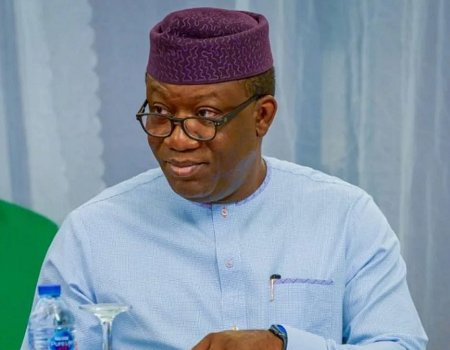The Senior Special Assistant (SSA) to Governor Kayode Fayemi on Students Matters, Mr Olalekan Soyombo, has advocated a change in curricula across all levels of education for the nation to survive its current challenges and witnessed all-round development.
The governor’s aide in a statement titled, ‘Knowledge Economy and Ekiti Example’, on Thursday, in Ado-Ekiti, the state capital noted that the upgrade of curricular in schools will enable the country to meet up with the growing challenges in the 21st century and proffer needed solutions.
He explained that the nation must be ready to embrace the global standard in the education sector which would, in turn, lead to the industrial and technology-driven economy.
He said: ” Our education sector cannot continue to play very low in the League of Nations if our desire to transform to a technology-driven and industrialised nation does not go beyond a mantra.
“The reason we must address our curricula to meet up with the realities of the challenges of the 21st century. In the earliest possible time, agenda must be mapped out to revamp our various educational institutions across the board and tailor them along a path relevant to the requisite tools for economic transformation, industrialisation as well as information and communication technology.”
While lamenting the lack of adequate funding for education, Soyombo explained that there should be deliberate efforts from the government at all levels to invest in the sector he described as capital intensive.
ALSO READ: NIN/SIM linking: ‘Deadline now February 9’
“A qualitative and functional education doesn’t come cheap, a reason the United Nations’ Educational Scientific and Cultural Organisation (UNESCO) recommended that nothing less than 26% of budgetary allocation on a yearly basis must be committed to the education sector to help fast track its development and position it as a tool of economic development and transformation,” he said.
The SSA commended Governor Fayemi for his policies and programmes towards improving the standard of education in the state, adding that, “Fayemi also in his pragmatic affinity made students and teachers the critical consideration in setting the agenda for quality education.”
According to him, “Fayemi noted that there should be a significant relationship between teacher effectiveness and school effectiveness, and the result of multiple regression analyses indicated that independent variables like teacher’s classroom management skills and qualifications made significant positive contributions to teacher effectiveness.
“This suggestive excursion triggered scientific monitoring and implementation of Fayemi’s education policy believing that serial and genuine implementation of the policy is as important as its formulation.
“Fayemi ensured that the inspectorate division of the ministry of education takes seriously the monitoring of what goes on in our classrooms of learning and its environs.”
Fayemi’s aide advocates change in education curricula for rapid development
WATCH TOP VIDEOS FROM NIGERIAN TRIBUNE TV
- Let’s Talk About SELF-AWARENESS
- Is Your Confidence Mistaken for Pride? Let’s talk about it
- Is Etiquette About Perfection…Or Just Not Being Rude?
- Top Psychologist Reveal 3 Signs You’re Struggling With Imposter Syndrome
- Do You Pick Up Work-Related Calls at Midnight or Never? Let’s Talk About Boundaries







